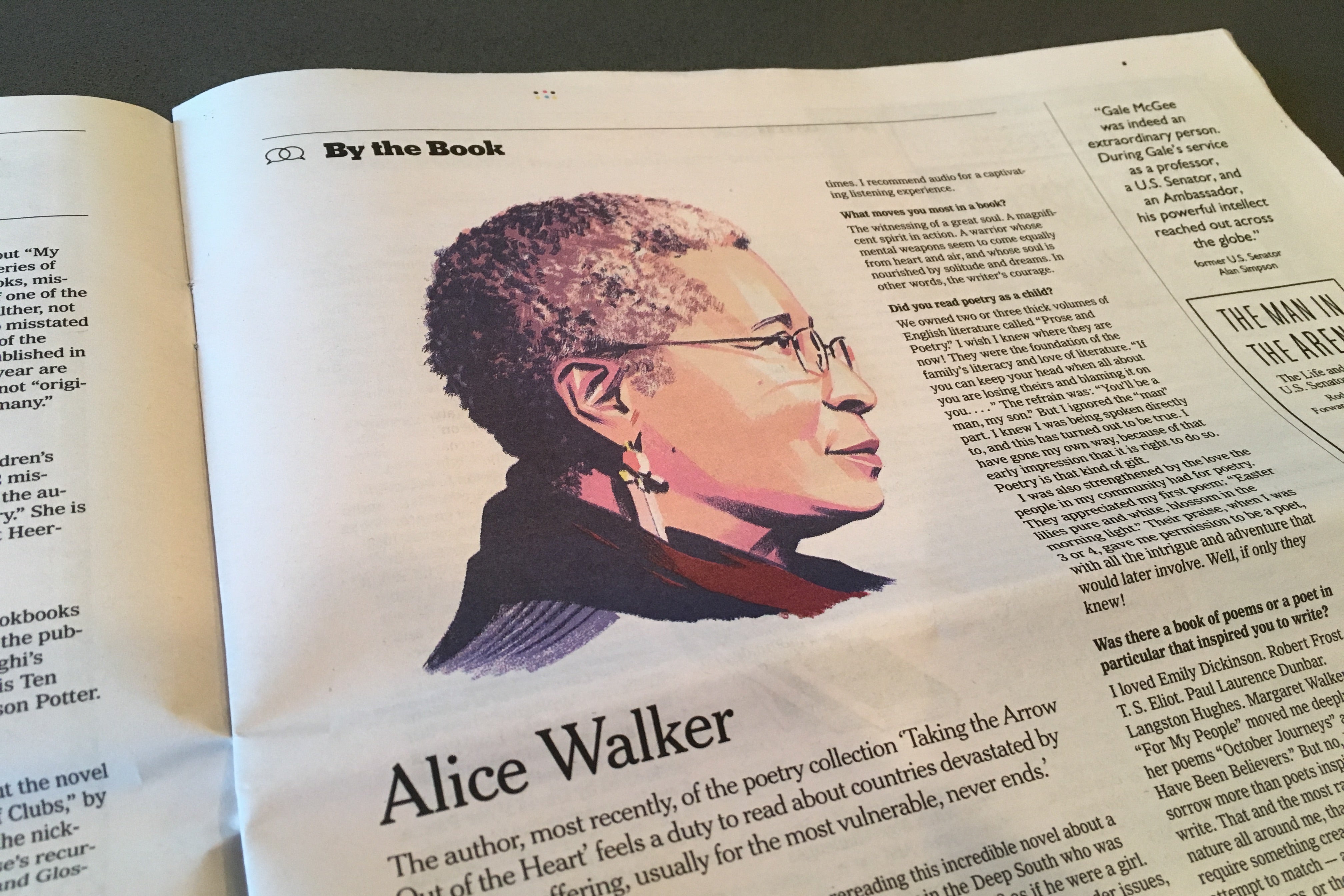“By the Book,” a weekly interview with an author about what he or she is currently reading begun in 2012, is widely regarded as one of the most successful recent innovations in the New York Times’ books coverage.* The New York Times Book Review—keenly scrutinized and critiqued by publishers and writers seeking to see their own interests advanced—isn’t a publication that can easily accommodate innovation, but “By the Book” has been popular enough to result in an anthology of past columns, published in 2015. As a person who believes that talking about what you’re reading is more interesting than talking about what you’re writing, I’ve long been a fan.
“By the Book” has also generated some glimmers of controversy over the years, but none to compare with the uproar occasioned by the Dec. 13 column interviewing Alice Walker, author of The Color Purple and a big fan of the wackadoo conspiracy theorist David Icke. Icke believes that a race of man-sized lizards wearing human disguises rules the world, but less entertainingly, he’s also an anti-Semite. When asked which books were on her nightstand, Walker included one of his, And the Truth Shall Set You Free. “In Icke’s books,” she rhapsodized, “there is the whole of existence, on this planet and several others, to think about. A curious person’s dream come true.”
Critics on Twitter and in the press expressed puzzlement and outrage that the New York Times Book Review conveyed Walker’s praise without comment, qualification, or follow-up. By Tuesday, the questions had grown raucous enough to merit a response from the Times in the form of an interview with the Review’s editor, Pamela Paul, in the paper’s “reader center.” Paul explained that “By the Book” is conducted via email, “not a regular phone or in-person interview where you would follow up with questions about their answers.” Furthermore, the editors of the Review have never in the history of “By the Book” supplied context, commentary, or any other form of addendum to an author’s responses. “We do not issue a verdict on people’s opinions,” Paul stated; asked if, in retrospect, she would have done anything differently with Walker’s column, Paul said, “No.”
This isn’t the first time Walker has voiced her enthusiasm for Icke’s work and gotten little pushback. Cultural journalists are apparently all too happy to beam distractedly at the ramblings of a beloved literary figure whom no one pays much attention to anymore and move on. That’s the whole point of enjoyably puffy bits of content like book lists—you can devote as little attention to reading them as did their editors to publishing them. For the NYTBR, qualifying any of Walker’s answers would have meant dissolving the illusion that “By the Book” records a cozy bookish chat instead of perfunctory exchange of emails between two people who haven’t even spoken to each other. And as Paul acknowledges, in the past, readers have complained about “By the Book” interviews with male authors who only seem to read books by other men; novelist Lauren Groff called them out for it in “By the Book” itself. Making Walker, who is black, the only author to be effectively scolded by the editors of the New York Times Book Review for her choice of reading material surely wasn’t the right move, either.
“By the Book” was never meant to be so fraught, yet Paul was reduced to defending her section by defining a feel-good check-in with some public figure about their anodyne TBR list as, actually, news: the bad kind. “If people espouse beliefs that anyone at The Times finds to be dangerous or immoral,” she told her own interlocutor, “it’s important for readers to be aware that they hold those beliefs. The public deserves to know.” But will they? Icke, a member of the crackpot fringe, is hardly a household name. “The Times can assume that 100 percent of its readers know what Mein Kampf is,” one reader wrote in response to the interview with Paul. But unless they investigate further, they won’t realize that Walker has endorsed an anti-Semitic loon. Doesn’t the Times owe its readers this contextual information?
The whole fiasco could have been averted by killing the piece, or by simply not interviewing Walker in the first place. And this is perhaps the most irksome thing about the Times’ serene response to the furor, at least for other journalists: the retconning of what was most likely a sloppy oversight into an unvarnished exposé. The Walker interview is what sometimes happens when a reliable feature like “By the Book”—that editor’s dream, a way to get famous authors to write for you for free—becomes a bit too reliable as a source of ready content.
Chances are, no one at the Review knew about Walker’s more dubious intellectual enthusiasms before deciding to interview her for the column, and once she’d sent back her response, no one bothered to Google the authors she recommended. Paul is right about one thing, however, even if the Times’ online critics are more responsible for it than the Times itself: A lot more people know the ugly truth about Walker and Icke now.
*Correction, Dec. 19, 2018: An earlier version of this article misstated that the “By the Book” column in the New York Times Book Review began under the editorship of Pamela Paul. The column began in 2012 under the editorship of Sam Tanenhaus. Pamela Paul became the Review’s editor in 2013.
